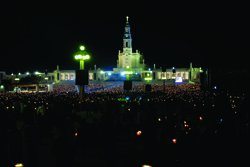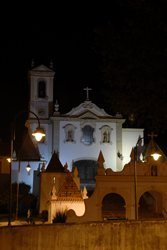
The Portuguese parliament’s approval of same-sex “marriage” on January 8 is shocking for many reasons.
A Challenge to Our Lady of Fatima
First, the fact itself legalizes a practice aberrant to nature and also discredits marriage. Then, this law was passed in the land of Our Lady of Fatima, as if defying the Blessed Virgin’s message of conversion, penance and warning of divine retribution. Finally, it is shocking because the vote was held in haste, just before the visit of Pope Benedict XVI, who will preside over the May 13 ceremonies in Fatima.
This is one more Catholic nation to commit a public sin against God by “normalizing” through “marriage” an act against nature which the catechisms rank among the “sins that are said to cry out to God for vengeance.”1
How Was This Possible
There is no doubt that the general decay of morals, chaos in people’s minds, loss of the sense of logic and of the moral sense, have also hit the country once known as the Land of Santa Maria (Saint Mary).2 However, that alone does not explain what happened. We must also consider another phenomenon, painful to Catholic hearts.
Unfortunately, it is not rare for some bishops and cardinals to present “dialogue” as a way to avoid confronting the errors of the modern world even when they are so clearly aberrant such as abortion and so-called homosexual “marriage.” The latter is supposed to “normalize” the practice of homosexual acts by equating them with the conjugal act in legitimate marriage.
“They Follow Their own Stubborn and Wicked Inclinations”
Thus, instead of combating the things that are directly opposed to Catholic doctrine — and in this case of natural law — with the evangelical language,“yea, yea: no, no,”3 they seek to “dialogue” with the advocates of such errors.
Any “dialogue” with people bent on trampling upon the Decalogue and the natural law is as useless as trying to prevent snow from melting in the sun’s heat or rain from wetting the fields. How does one dialogue those with hardened hearts? Of such said the Prophet Jeremias: “But they did not listen, they did not pay attention; they followed their own devices, their own stubborn and wicked inclinations, and got worse rather than better.”4
The Bitter Fruits of Concession
Unfortunately, in Portugal, the position of the bishops’ conference and above all that of the Cardinal Patriarch of Lisbon,5 Most Rev. José da Cruz Policarpo, has been one of dialoguing in such a way that it rather confused and discouraged Catholics instead of attaining any positive result in the defense of religion and Christian civilization.
The result of years of such policies has been tragic:
In 1975, divorce, which had been approved by the socialist Republic in 1910 and ceased to be applicable to Catholics in 1940, was extended to everyone, even those married in the Church. In 2008, that divorce law was broadened with the approval of “fast track” or “no-fault divorce.”
Abortion was legalized in 2007; and now, in 2010, the Portuguese Parliament approved homosexual “marriage.”
Is it any wonder that the number of Catholics in Portugal is increasingly falling? Portugal’s 2006 Catholic Yearbook recorded 91.52% of the population as Catholic; three years later, in 2009, that number dropped to 88.10%. In other words, there is a loss of more than one percent per year. Furthermore, for every two priests who die, only one is ordained to replace them.6
The Same Inertia as When Abortion Was Approved
In 2007, a national plebiscite was held to decide on the law authorizing abortion. The attitude of the Portuguese bishops, and above all that of the Cardinal Patriarch, was to avoid a clash. The laity took the initiative to fight against abortion but they were unable to count on support from the clergy, since ecclesiastical authorities forbade them to speak from the pulpit against the approval of abortion. They could deal with the issue only theoretically, without attacking the proposed legislation.
Moreover, the Cardinal made confusing statements that he later rectified, when he stated that abortion was not a religious issue.7 Worse, after the law’s approval, he refused to ask the country’s president, his personal friend, to veto it.8
“Ecclesia Militans” or “Ecclesia Dialogans”?
Now we see the bishops taking the same non-militant attitude toward same sex “marriage.” They have issued the same purely theoretical communiqués, devoid of any indignation towards this evil. Once again, they have failed to lead the Catholic fold. After the law was approved, the reaction of the bishops was very moderate.…

In an interview of December 31, 2009 to the Catholic news agency Ecclesia,9 the Cardinal Patriarch of Lisbon, Most Rev. José Policarpo, presented the “philosophy” behind this attitude.
He offered a view of the position of the Church toward evil as purely passive, one of mere “witness” and of “dialogue with everyone.”
One would say that he considers the Church not as an “Ecclesia militans” but only as an “Ecclesia dialogans…”
The cardinal says: “In the face of some very ‘hot’ethical questions that touch the conscience, Catholics who are very much against it run the risk of remaining on the political platform, of reacting only politically. … But the classic method of the Church to be in society is for Christians to bear witness, a difference marked by the attitude one has toward realities and dialogue with everyone.”
Furthermore, the Patriarch of Lisbon admits that Catholics can ask for a referendum as a way to forestall the law, but insists that such a decision will be up to the socialist-dominated Parliament. He makes it clear that the Church will not support effectively those laymen:
“A referendum is a political institution and as I see it, it is not for the Church to request it. Christians have the right to ask for it and it is always decided upon by the Parliament. … The initiative to ask for a referendum belongs to citizens. I know many of them are Catholic. They have every right to do it. But I gave orientations for the signature petition campaign not to be proclaimed from the ‘Church rooftops.’”
As in the case of abortion, Cardinal José Policarpo avoided taking the discussion to the religious sphere, the only one that would have been effective in Portugal. Surprisingly, he presented marriage as a merely cultural matter, thus ignoring natural law and the fact that Our Lord elevated Christian marriage to the dignity of a sacrament, giving it a supernatural dimension:
“The issue at hand is not homosexuality. If we discuss it, the discourse has other parameters. At this moment, what is at stake is the nature of marriage, which is not a religious question but rather a cultural one. Millenary cultures consider marriage a contract between a man and a woman, which gives rise to an institution, the family. To change this millenary understanding of what the family is in humanity, can have very grave consequences in the future.”
The reporter asked the Cardinal Patriarch whether one should seek a legal formula for homosexual unions. The answer was ambiguous:
“I will not speak my mind about that. I believe that no one, in a democratic framework, even being in disagreement, will contest these persons’ right to live together. Whether they are or not recognized by the State is another matter. Now, let them not put the family, already so weakened, in the same bag with other issues!”
The implication is that the evil is not in the fact that two people of the same sex live in carnal intimacy but only in calling that state “marriage,” as it will “weaken” the family. Not a word about sin and the offense done to God!
Was There an Agreement Behind Closed Doors?
The statements and attitudes by the Cardinal Patriarch of Lisbon on the law legalizing homosexual “marriage” were so compromising that rumors arose that he had made an agreement with socialist Prime Minister José Sócrates whereby the Church would not fight the legislation.
News headlines in this regard are telltale: “Homosexual marriage: — Socrates at ease as Cardinal refuses to wage holy war on gay marriage;”10 “Homosexual Marriage: Cardinal Patriarch of Lisbon denies ‘pact’ with Socrates;”11 “Homosexual Marriage: Cardinal Patriarch of Lisbon denies ‘pact’ with Prime Minister;”12 “Cardinal Patriarch refuses to comment approval of homosexual unions at the Council of Ministers — D. José does not speak about gay marriage.”13
Pressured by public opinion, Cardinal Policarpo issued a letter to the faithful explaining his attitude.14 Yet, the letter fails to clarify the main point: the bishops’ complete lack of initiative against the proposed legalization.
The Cardinal says that he did in fact receive the socialist prime minister on October 20 and that during the conversation they analyzed the issue of homosexual “marriage.” However, the letter says, “The Church hierarchy retains … all its freedom to announce her doctrine about this issue.” He added that they will announce this doctrine when they deem it opportune.
However, the letter insists that the bishops will establish “dialogue with persons and institutions” and rules out the possibility that the hierarchy might bring to bear “public forms of political pressure which Christians, exercising their rights as citizens, are free to promote or participate in.” The letter closes by stating: “At this time, it is not a question of taking a stand about homosexual persons; Church doctrine, marked by truth and charity, is clearly expressed [in this matter]. The question is to safeguard the truth about marriage and the family.”

The Bishops Were Established as “Guards of the Sanctuary”
The bishops’ function is to be the “guards of the sanctuary.”15 It behooves them to watch over the fold to prevent attacks by voracious wolves and protect the faithful entrusted to their custody.
More than trying to establish good relations with the enemies of the Church, the bishops must preserve the faith of Catholics.
However, this requires them to effectively combat the moral errors disseminated in temporal society and, above all, the laws that give such errors a seal of legality. The faithful live in the world, although they are not of the world.16 We must note that our surroundings exercise a powerful influence upon us and can be a great obstacle for salvation.
It is not enough simply to recall Catholic doctrine to those seeking to know the truth. Our Lord did not ask the Apostles to place themselves at the disposal of those who wished to know the truth. On the contrary, He positively commanded them to go out in the world preaching the Gospel: “Go therefore,” said the Savior, that is, take the initiative “and make disciples of all nations, baptizing them in the name of the Father, and of the Son, and of the holy Spirit, teaching them to observe all that I have commanded you” (John 28:19-20).
Let us beseech Our Lady of Fatima, whose message inspires this struggle, to come to our aid in face of this tragic situation. May she hasten the triumph of her Immaculate Heart, as she promised the three little shepherds.
Footnotes
- Catechism of St. Pius X: The Vices and other Very Grievous Sins, “8 Q. Which are the sins that are said to cry to God for vengeance? A. The sins that are said to cry to God for vengeance are these four: (1) Willful murder; (2) The sin of sodomy; (3) Oppression of the poor; (4) Defrauding labourers of their wages.” Cf. Catechism of the Catholic Church, n. 1867.
- Portugal was thus called because the kingdom’s founder and first king, Afonso Henriques, together with his vassals, placed the newborn country under the protection of the Virgin Mary in a solemn ceremony on April 28, 1142.
- “But let your speech be yea, yea: no, no: and that which is over and above these, is of evil.” (Matthew, 5:37.)
- Jeremiah 7:24 (Catholic New Jerusalem Bible, at http://www.catholic.org/bible/book.php?id=30).
- In 1716, Pope Clement XI granted the archdiocese of Lisbon the honorific title of Patriarchate.
- Cf. Anuário Católico de Portugal confirma quebra estatística, http://www.agencia.ecclesia.pt/cgi-bin/noticia.pl?id=29734; Anuário Católico 2009 mostra quebra estatística, http://www.agencia.ecclesia.pt/cgi-bin/noticia.pl?id=71842.
- Rita Carvalho, “O aborto não é um problema religioso,” Diário de Noticias, 27 Setembro 2006, http://dn.sapo.pt/inicio/interior.aspx?content_id=646630; Agência Ecclesia, Posição do Patriarca de Lisboa sobre o aborto — D. José Policarpo esclarece declarações à comunicação social, 19 de Outubro de 2006, http://www.agencia.ecclesia.pt/cgi-bin/noticia.pl?id=38279.
- Cf. Luiz Sérgio Solimeo, Why Did Catholic Portugal Legalize Abortion?, https://tfp.org/tfp-home/catholic-perspective/why-did-catholic-portugal-legalize-abortion.html; Idem, After Holy Week, 11 April 2007 15:00, https://tfp.org/tfp-home/news-commentary/after-holy-week-portugal-approves-abortion-law.html.
- Agência Ecclesia: «Não» ao casamento entre pessoas do mesmo sexo é questão civilizacional Acontecimentos de 2009 analisados por D. José Policarpo, http://www.agencia.ecclesia.pt/cgi-bin/noticia.pl?id=76984.
- http://www.ionline.pt/interior/index.php?p=news-print&idNota=38003.
- http://www.ionline.pt/conteudo/38899-casamento-homossexual-cardeal-patriarca-lisboa-nega-pacto-com-socrates.
- http://www.publico.clix.pt/Sociedade/cardeal-patriarca-de-lisboa-nega-pacto-com-primeiroministro_1415058.
- http://www.correiomanha.pt/noticia.aspx?channelid=00000021-0000-0000-0000-000000000021&contentid=
6B44C69C-11E1-47CC-A244-E59D8E2C2C4D. - Ecclesia, December 22, 2009, http://www.agencia.ecclesia.pt/cgi-bin/noticia.pl?id=76889.
- Numbers, 3:28.
- Cf. John 15:18-19.

